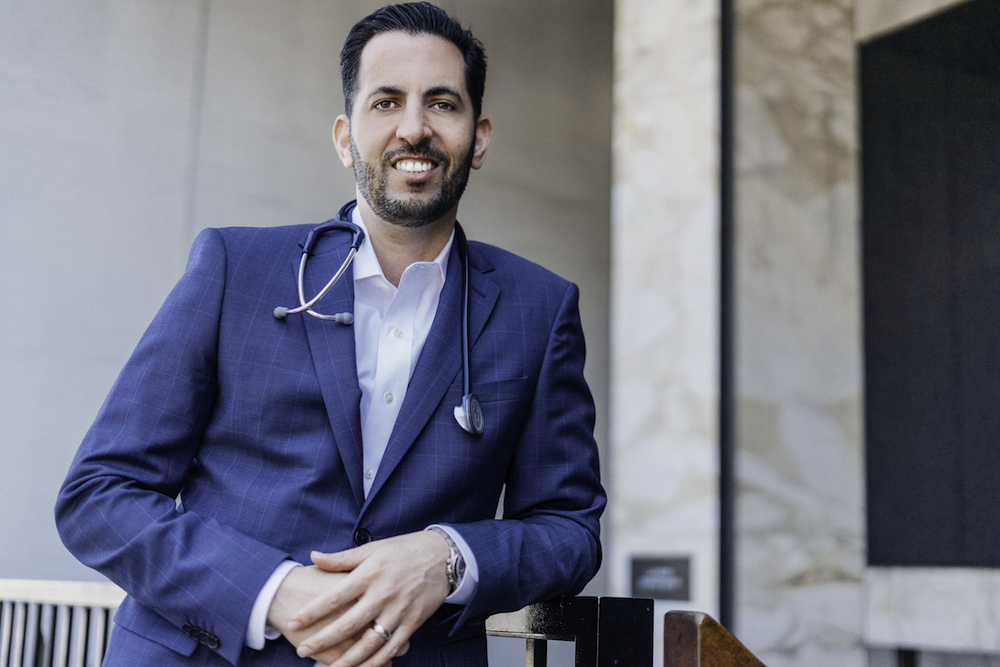Q. Where did you grow up and go to school?
A. Initially, I grew up in Beverly Hills and went to Santa Monica High School. I went to UCLA as an undergrad, so I’m a native Los Angeles guy.
Q. When did you know you wanted to go in the specific field that you’re in?
A. Well, basically my last month of medical school I did a rotation at Miami Children’s Hospital. The doctor that I was working with, the attending for that rotation, was a pediatric GI doctor. He got me exposed to the GI field, dealing with children. So it started from there. When I started residency, I had gastroenterology in mind. I did rotations during my residency in gastroenterology.
Q. What is the current position that you’re in right now? What does it entail in your day-to-day life?
A. I have a full state-of-the-art gastroenterology practice, Gastroenterology Institute of Southern California. We do everything in-house. All the nice procedures, such as capsule endoscopy, breath tests, stuff that maybe other GI’s send patients to the hospital to do, we have everything in here. I’m either doing procedures in the operating room, seeing patients in the office or patients in the hospital at Cedars Sinai. In our office, we have a full lab. Right here we do bloodwork, all sorts of x-rays and ultrasounds. We’re a full-service gastroenterology practice.
Q. What is your version of success?
A. Success is doing what you want to do or being fortunate enough to do what you want to do. I think that’s being successful. When you’re good at what you want to do, that’s even better. I think in order to be successful you have to be well-rounded. Whatever profession you’re doing, you have to be good at it. You have to enjoy going to work and the feedback to what you’re doing is positive, then I think that’s good. I don’t think success is monetary. A lot of people make a lot of money, but they’re not happy. I don’t know if I would consider them successful. There are people who are happy doing what they want to do and may not be making a lot of money. If you’re a value to what you do and you’re compensated well that’s even nicer.

Q. What does your industry need more of, if anything?
A. The way insurance is working these days, doctors don’t really have adequate time to spend with patients. The insurance companies are dictating what doctors get paid and each year, they’ve been lowering the reimbursements so doctors have to work harder to see more patients. I think the patients are the ones who are really suffering because now the doctor is spending three to four minutes with them. If they’re lucky they may get a nurse practitioner with whom they can spend a couple more minutes. And, at least in my field, it’s really difficult to find out what the root of the problem is in five minutes. My practice, we’re not contracted with insurance companies, so I spend 30 to 40 minutes with patients. I’ll double book. So if they’re spending time in the waiting area or exam room, they’re spending time with me. So we do a lot of one-on-one. I micromanage my patients. In today’s healthcare model, it’s difficult to do that.
Q. What was the biggest challenge in getting to where you are right now?
A. The whole private practice is a dying model. When I started my practice a lot of people tried to convince me not to do that. It’s tough when you start to practice on your own. I didn’t partner up with anybody. Just learning the everyday nuances of running a practice was the most challenging. It takes a few years before you learn everything. I don’t even know if you ever even learn everything as far as the business aspect. I remember when I opened up my practice, the first patient came and gave us a credit card and we realized we didn’t even have a credit card machine. When you start brand new on your own, you’re going to fall on your face a few times. You learn from your mistakes. If I knew eight or nine years ago what I know today, I would have had a big head start. The toughest thing is surviving in this new medical model where they’re trying to get rid of private doctors. They want all doctors to be working for a hospital, a facility, or insurance company. As a private practice positioner, there’s a lot I have to do that other doctors don’t have to do who work for a hospital.
Q. Based on your experience in your industry, do you feel your skill set is best served for private industry or public?
A. The main thing is I wanted to have control of my life. Be my own boss. I want to be able to set my own hours. I want to work hard and benefit from that, not have someone else benefit. In hospitals, you don’t have to market yourself. They do everything for you. You show up and see patients daily. But in private practice, you kind of have to go the extra mile and provide the service. You have to go out of your way to make sure everyone is happy because, at the end of the day, your patients are based on referrals from other patients. In private practice, everything is out there, good and bad. So you have to make sure you don’t tarnish your reputation. In today’s day and age with social media and Yelp, patients have access to a lot of information before they come to see you. Your reputation is more important today than ever, compared to like 20 years ago. Before they couldn’t get information on you, there was no internet to do a Google search on someone. Now everything is at your fingertips. You find out the same day when something happens. Before you would have to wait until the next day for it to show up on print.
Q. What is the best piece of advice you’ve ever gotten?
A. One of the best pieces of advice was to be my own boss. So most positions today instead of going to private practice, go to work at a hospital. To be available to see patients and treat patients like family, that’s the motto I go by.
Q. What would you say to a room full of 100 students who are graduating from college and starting to pursue their careers?
A. Most important, do what you want to do. Do what interests you in life, not what you think it’s going to be. Don’t go to medical school for the money aspect, go into whatever profession because you love the profession. If you absolutely love what you’re doing, eventually you’re going to be successful. But if you go into a field for the wrong reasons, if you’re not motivated in the morning to go to work, you’re not going to be successful. You have to work hard.
Q. Where did you grow up and go to school?
A. Initially, I grew up in Beverly Hills and went to Santa Monica High School. I went to UCLA as an undergrad, so I’m a native Los Angeles guy.
Q. When did you know you wanted to go in the specific field that you’re in?
A. Well, basically my last month of medical school I did a rotation at Miami Children’s Hospital. The doctor that I was working with, the attending for that rotation, was a pediatric GI doctor. He got me exposed to the GI field, dealing with children. So it started from there. When I started residency, I had gastroenterology in mind. I did rotations during my residency in gastroenterology.
Q. What is the current position that you’re in right now? What does it entail in your day-to-day life?
A. I have a full state-of-the-art gastroenterology practice, Gastroenterology Institute of Southern California. We do everything in-house. All the nice procedures, such as capsule endoscopy, breath tests, stuff that maybe other GI’s send patients to the hospital to do, we have everything in here. I’m either doing procedures in the operating room, seeing patients in the office or patients in the hospital at Cedars Sinai. In our office, we have a full lab. Right here we do bloodwork, all sorts of x-rays and ultrasounds. We’re a full-service gastroenterology practice.
Q. What is your version of success?
A. Success is doing what you want to do or being fortunate enough to do what you want to do. I think that’s being successful. When you’re good at what you want to do, that’s even better. I think in order to be successful you have to be well-rounded. Whatever profession you’re doing, you have to be good at it. You have to enjoy going to work and the feedback to what you’re doing is positive, then I think that’s good. I don’t think success is monetary. A lot of people make a lot of money, but they’re not happy. I don’t know if I would consider them successful. There are people who are happy doing what they want to do and may not be making a lot of money. If you’re a value to what you do and you’re compensated well that’s even nicer.
Q. Why a private practice instead of working for a hospital?
A. The main thing is I wanted to have control of my life. Be my own boss. I want to be able to set my own hours. I want to work hard and benefit from that, not have someone else benefit. In hospitals, you don’t have to market yourself. They do everything for you. You show up and see patients daily. But in private practice, you kind of have to go the extra mile and provide the service. You have to go out of your way to make sure everyone is happy because, at the end of the day, your patients are based on referrals from other patients. In private practice, everything is out there, good and bad. So you have to make sure you don’t tarnish your reputation. In today’s day and age with social media and Yelp, patients have access to a lot of information before they come to see you. Your reputation is more important today than ever, compared to like 20 years ago. Before they couldn’t get information on you, there was no internet to do a Google search on someone. Now everything is at your fingertips. You find out the same day when something happens. Before you would have to wait until the next day for it to show up on print.
Q. What is the best piece of advice you’ve ever gotten?
A. One of the best pieces of advice was to be my own boss. So most positions today instead of going to private practice, go to work at a hospital. To be available to see patients and treat patients like family, that’s the motto I go by.
Q. What would you say to a room full of 100 students who are graduating from college and starting to pursue their careers?
A. Most important, do what you want to do. Do what interests you in life, not what you think it’s going to be. Don’t go to medical school for the money aspect, go into whatever profession because you love the profession. If you absolutely love what you’re doing, eventually you’re going to be successful. But if you go into a field for the wrong reasons, if you’re not motivated in the morning to go to work, you’re not going to be successful. You have to work hard.












